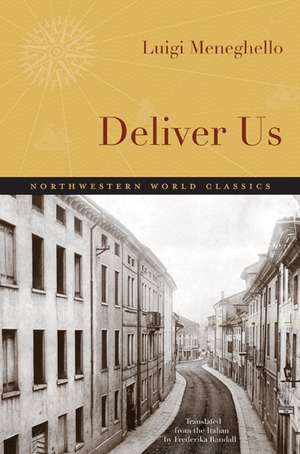Deliver Us: Northwestern World Classics
Autor Luigi Meneghello Traducere de Frederika Randallen Limba Engleză Paperback – 26 mai 2011
Originally published in 1963, and today considered a landmark in twentieth century Italian literature, Luigi Meneghello’s Deliver Us is the memoir, not of an extraordinary childhood, but of the very ordinary one the author shared with most of his generation, when Italy was a rural country under the twin authorities of Church and Fascism. His boyhood begins in 1922, the year of Mussolini’s March on Rome, and ends when Meneghello, 21, goes up into the hills to join the partisans. Called a romanzo—a story, although not a novel, as that term usually suggests—the book is a genre all of its own that mixes personal and collective memory, amateur ethnography, and reflections on language. Meneghello’s sharp insights and narrative skill come together in an original meditation on how words, people, places, and things shape thought itself.
Only loosely chronological, Deliver Us proceeds by themes—childhood games, Fascist symbols, religious precepts, and the rites of poverty, of death, of eros, and of love. Meneghello’s ironic musings and profoundly honest recollections make an utterly unsentimental human comedy of that was the whole world to his dawning consciousness.
Only loosely chronological, Deliver Us proceeds by themes—childhood games, Fascist symbols, religious precepts, and the rites of poverty, of death, of eros, and of love. Meneghello’s ironic musings and profoundly honest recollections make an utterly unsentimental human comedy of that was the whole world to his dawning consciousness.
Preț: 149.91 lei
Preț vechi: 173.27 lei
-13% Nou
Puncte Express: 225
Preț estimativ în valută:
28.69€ • 29.59$ • 23.94£
28.69€ • 29.59$ • 23.94£
Carte indisponibilă temporar
Doresc să fiu notificat când acest titlu va fi disponibil:
Se trimite...
Preluare comenzi: 021 569.72.76
Specificații
ISBN-13: 9780810127425
ISBN-10: 0810127423
Pagini: 358
Dimensiuni: 130 x 197 x 33 mm
Greutate: 0.39 kg
Ediția:New.
Editura: Northwestern University Press
Colecția Northwestern University Press
Seria Northwestern World Classics
ISBN-10: 0810127423
Pagini: 358
Dimensiuni: 130 x 197 x 33 mm
Greutate: 0.39 kg
Ediția:New.
Editura: Northwestern University Press
Colecția Northwestern University Press
Seria Northwestern World Classics
Notă biografică
LUIGI MENEGHELLO (1922–2007) was among Italy’s most acclaimed twentieth century writers. After taking part in the resistance during the war, he accepted a one-year scholarship to the University of Reading in 1947. This led to a teaching appointment in the English department, and in 1961 Meneghello founded a highly influential Italian Studies department, which he led until his retirement from teaching in 1980. Deliver Us (Libera nos a malo 1963) was his first book. Among his other significant books are I piccoli maestri (1964), about the Italian resistance; Pomo pero (1974), Fiori italiani (1976) and Jura (1987), on the nature of speech, writing, and literary form.
FREDERIKA RANDALL's translations include Padre Pio: Miracles and Politics in a Secular Age (2010) and The Body of Il Duce (Metropolitan Books, 2005) by Sergio Luzzatto; and Sicilian Tragedee by Ottavio Cappellani (2008). A journalist in Rome, she has written for The New York Times, The Nation, and many other publications.
FREDERIKA RANDALL's translations include Padre Pio: Miracles and Politics in a Secular Age (2010) and The Body of Il Duce (Metropolitan Books, 2005) by Sergio Luzzatto; and Sicilian Tragedee by Ottavio Cappellani (2008). A journalist in Rome, she has written for The New York Times, The Nation, and many other publications.
Cuprins
Translator's Introduction: The Dispatriate
Deliver Us
On Vicentino Usage (Author's Note)
Appendix A: Important Types of Death
Appendix B: Matters of Malo
Appendix C: Toward a Dedication
Translator's Notes
Deliver Us
On Vicentino Usage (Author's Note)
Appendix A: Important Types of Death
Appendix B: Matters of Malo
Appendix C: Toward a Dedication
Translator's Notes
Recenzii
"In these charming, lucidly affectionate reminiscences of growing up in a small Italian town, Luigi Meneghello recreates the codes, traditions, and the vigorous dialect of a world caught on the brink of modernity. Translated with rare sensitivity and fluency by Frederika Randall, this humane and wonderfully readable classic of Italian literature brings a richly fascinating culture vividly alive." —Eva Hoffman, author of Appassionata and Lost in Translation: A Life in a New Language
"Written with irony, compassion, and humor, Deliver Us evokes the small-town Italy of Meneghello's youth, a complex local world, simultaneously obedient and resistant to the reigning Catholic and Fascist orders." —James Clifford, Distinguished Professor in the Humanities, University of California, Santa Cruz
Descriere
Originally published in 1963, and today considered a landmark in twentieth century Italian literature, Luigi Meneghello’s Deliver Us is the memoir, not of an extraordinary childhood, but of the very ordinary one the author shared with most of his generation, when Italy was a rural country under the twin authorities of Church and Fascism.










